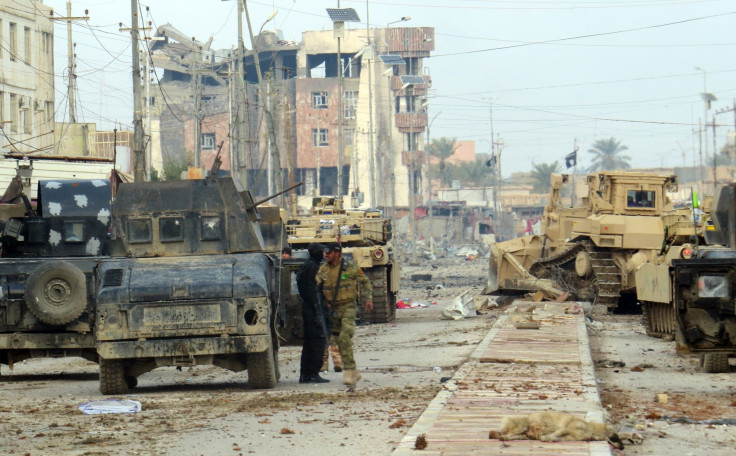ISIS Attack In Ramadi? Iraqi Military Base Threatened After Troops Liberate City From Islamic State: Reports

Islamic State group militants reportedly attacked an Iraqi base in Ramadi on Friday, just days after national troops announced they had liberated the city from the extremists' control. According to posts on the SITE Intelligence Group's website, the militants -- also known as ISIS or ISIL -- also claimed they had taken over about 20 army barracks and posted photos online of their fighters standing in the city's main government complex.
Agence France-Presse confirmed only that ISIS had attacked an Iraqi army compound Friday in north Ramadi. "They used six suicide vehicles followed by a commando of fighters wearing explosive belts," an unidentified military source told AFP. "They managed to take control of the base when the army had to pull out because it suffered casualties. ... Iraqi forces have since counter-attacked and retaken control, with aerial coalition backing."
Iraqi forces spent the week celebrating what they called the official recapture of Ramadi, a city about 70 miles outside the capital, Baghdad. Ramadi fell to ISIS in May, and its recent liberation was considered a major victory for the U.S.-aided soldiers.
Iraqi troops and local police were working Friday to clear the city of explosives and break up pockets of resistance. About 700 ISIS fighters were thought to be hiding in the city, Reuters reported.
Details about Friday's attack — or attacks — were scarce and often contradictory. Al-Masdar News reported that ISIS said it captured 11 army bases, which the Iraqi army has said is false. "It is most probable that the center of Ramadi and its bridges have not been captured by ISIS but these initial reports still linger," according to Al-Masdar News.
#ISIS conducted a counter off. 2day in #Ramadi reaching the govt. complex that #ISF had celebrated taking 3 days ago pic.twitter.com/mxEE3fY413
— Shami Rap (@ScottMikey1111) January 1, 2016Setback for Iraqi forces in #Ramadi. #ISIS & ISF sources: "Iraqi forces ambushed & retreated after suffering loses". pic.twitter.com/5AhCVc14P8
— Garmıyanı #Bakûr (@Sarbarzi) January 1, 2016#ISIS outlets released pictures of armored vehicles captured from Iraqi forces in albu Tarah, Northern #Ramadi. pt pic.twitter.com/110LDJw2nB
— Garmıyanı #Bakûr (@Sarbarzi) January 1, 2016Once Ramadi is secure, Iraqi Prime Minister Haider Al-Abadi has said, he intends next to focus on Mosul, which ISIS has occupied since June 2014. But Mosul may pose a different challenge.
"It's a big, big, big city, and it is going to take a lot of effort," Col. Steve Warren, a spokesman for the coalition against ISIS, told CNN. "It's going to take more training, it's going to take more equipment and it's going to take patience."
© Copyright IBTimes 2024. All rights reserved.





















